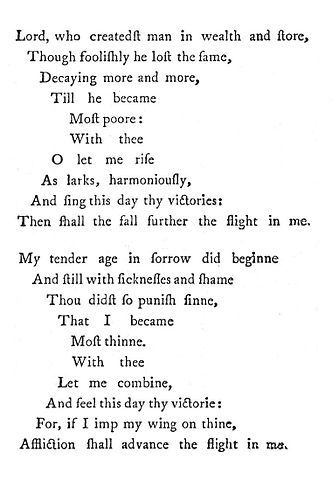
Whether these were also the best circumstances for a future poet is also answered when we learn that one of Magdalen’s close friends was John Donne, twenty years George’s senior. It is clear that George Herbert grew up in excellent circumstances for a future academic and priest. When her mother-in-law died, she moved the family again, this time to Oxford, where her oldest son Edward was in school. Drury notes dryly that her family, the Newports, were not only richer than the Herberts but “owned much of Shropshire and were more civilized.” Magdalen herself seems highly adaptable and always interested in her children’s education. She was from an even more prominent family than the Herberts and, after Lord Herbert’s death, moved herself and her children into her own family home, there to live with her widowed mother. His father died when George was only three, and, according to Drury, her husband’s death was the making of his mother Magdalen. He was the seventh child of Lord Richard and Magdalen Herbert. Reading through The Temple, one does have the sense in poem after poem of being in the presence of a private conversation between the poet and his God.īut if Herbert can be considered guilty of any snobbery (an attitude no one who knew him ever saw), he was born into the aristocracy after all, unlike Donne and Jonson, and understood the difference between his rank and those below him. Today we might say that Herbert was writing for himself, having chosen a much less public life than some of his Jacobean contemporaries, like Donne or Ben Jonson. The Temple, the collection that includes most of what we know and value of Herbert’s poetry, was published the year of his death in 1633 and went into several printings over the remaining century.

But Drury infers, and I think correctly, that was because, in Herbert’s case, “he was writing for God.” Fortunately, for readers of both Donne and Herbert, publication did come shortly after they died, only a couple of years apart.

George Herbert, having nothing like Donne’s apprehensions about his remaining manuscripts, still kept them private throughout his career. And Donne left specific instructions with regards to a manuscript of his own, Biathanatos, which may have been a defense of suicide, that when he died, it neither be burned nor printed, and was similarly anxious about the fate of his secular poems, many of which we know to be erotic. During Herbert’s time, the attitude of some to prefer to keep their writings from being printed was considered “the snobbery of manuscript.” Herbert’s poetry, like that of his older friend John Donne, did not see publication until after he died. Toward the end of his thoughtful new critical biography of the great seventeenth-century English poet George Herbert, John Drury considers the literary legacy of Herbert and the necessity of publication.

Writing for God: The Life and Work of George Herbert


 0 kommentar(er)
0 kommentar(er)
